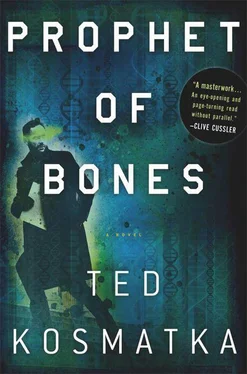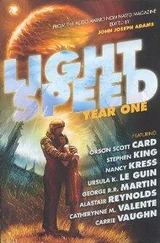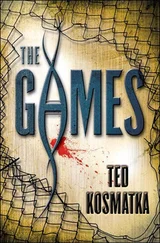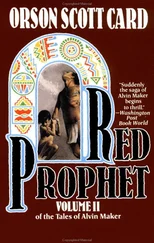He started paddling again.
Right-left-right-left.
Paddling was digging, was the forceful displacement of water.
Up ahead, the curl of rock revealed itself as blackness. Flat black against the dark shine of the water. He pulled harder with his right arm, easing gradually closer to shore.
In ten minutes he was there, the black shore looming above him now—reeds and mud and rising gravel. He sensed the water shallowing beneath him and gave a last powerful thrust, then coasted.
The boat scraped bottom, its nose easing upward onto the muddy bank. Paul climbed out and slid the paddle into the hollow of the kayak. He dragged the boat into the bushes.
He crouched, breathing hard—the enormity of what he was doing sinking in. He was here. He was really going to do this.
He stood and checked his backpack, then made his way upward away from the water. He wore dark clothes: black sweatpants and a black hooded sweatshirt.
He moved quickly up the slope, out of the reeds and brush, and there was suddenly grass under his feet. He ran. The darkness was not absolute. There was a quarter moon out, and it lit the way toward the building, across an expanse of manicured landscape.
Breaking into an unfamiliar building was difficult. Breaking into a building you’d worked in for four years was substantially easier. Particularly if you’d made the right preparations.
He ran toward the building and didn’t stop until he was against it. He stood, breathing, listening, his back pressed against the cold steel structure. The building rose above him. There was no sound.
He made his way around to the far corner and then slid toward the lower window. He sat. He leaned forward and pressed on the window. It swung inward. A hundred-thousand-dollar security system won’t help if somebody purposely disconnects the alarm on one window.
Paul dropped his backpack through the open window. The point of no return.
“Well, this is it,” he whispered to himself. He began to lower himself through the window and into the building. It was a tight fit; he squeezed through one shoulder at a time and dropped to the floor. He was in a storage room that contained paper towels, gloves, cleaning supplies, and a sink.
Standing upright, he took the flashlight from his backpack and slung the pack over one shoulder. He moved through the darkness. Here, like no time since the hospital, he felt the loss of his vision. He stopped. He calmed himself and started walking again. Once he was out of the storage room and away from the window, he dared the flashlight. White light made a circle on the floor.
He’d done some checking, and as far as he knew there were no motion detectors inside the main hallways. If there were, then he was fucked, and there was nothing he could do about it.
He didn’t trust the elevators, so he climbed the stairs.
Buildings seemed to have a different life at night. A secret life. Things are transformed by context. Like himself. During the day, he was a researcher. A respected scientist. But here, now, he was a criminal. A man in a hood who was trespassing on private property. If he was caught, then all the years of school—all the education, and the money, and his status as a scientist—it was all over.
He thought of James. He knew it could be worse. There were worse things to lose than your career.
He pushed out of the stairwell and onto the fourth floor. At the door, he pulled out Makato’s card. The door said GENE FREQ LAB in bold block letters.
Paul glanced at his watch. It was five forty-five A.M.—earlier than Makato usually arrived, but not unheard of. Makato was often the first person to arrive at the lab. If somebody looked at the entry logs several weeks from now, this five forty-five swipe might not jump out of the data set. It might not raise interest, might not present itself as a mystery that required an answer. Makato himself, if later asked, might not remember what time he’d come in on this particular day. He might not remember which day he’d gotten a flat tire and arrived late. He might not remember which day, exactly, his card had broken.
This five forty-five swipe was the kind of thing that might, just maybe, slide under the radar. But once Paul swiped through, there’d be no going back. He would have to hurry.
Paul took a deep breath, put the card into the reader, and swiped downward. The door beeped and opened.
He rushed inside, following the dark hall around the corner and sprinting past the door to the type lab where he and Janus worked. The lab he needed now was a little farther down the hall. Paul stopped at the door. ASSAYS was written on it in black letters. Paul placed the card in the reader and swiped downward. The light turned green and the door clicked open. He stepped inside and the lights came on automatically.
The room was large. Larger than the type lab by a dozen feet, with several broad desks and a stockpile of bulky equipment lining one wall. Gone was the wet lab setup—the sinks and the glassware and the centrifuge. Here the samples being studied were data. A pure data set. This was a math lab.
One wide window faced the parking lot. On the opposite wall were maps of chromosomes—large blowups of karyotypes and complex three-dimensional graphs that he didn’t understand. There were computers and filing cabinets and a single oversized photocopy machine. In the corner sat a circular computer terminus with four big flat-screen monitors arrayed in surround to a black leather swivel chair. This was where Makato sat.
Paul stepped over to the desk and sank into the leather. He looked at the screens. It was like sitting at a drum set, everything within reach. He ran his hand along the central keyboard.
He turned on the machine and the screen flashed to life. Blue light.
After a moment, the screen prompt:
Username:
Password:
Passwords had to be changed weekly, and the last user had to pick the new word. Tradition in the lab required you to sticky note the password to the side of the monitor, so that the next user could find it. The username was always the name of the instrument.
Paul felt along the side. There. He pulled the sticky note off the monitor. He stared at it. He stared at it for a long, long time.
He typed “assay” for the username.
For the password, he keyed in what was written on the sticky note. He typed the word “Flores.”
The screen flashed, went dark, and then an input screen popped up. The system had been designed by the same people who’d designed the type lab’s system, so Paul knew what to do.
Paul took the flash drive from his pocket and uploaded the file.
The screen changed.
Run analysis?
Paul typed “Yes.”
The screen flashed again, and a white box popped up. Paul hesitated. He wasn’t sure what to type. Finally, he typed “all.” Then he hit Enter.
The computer chirped, running the cross-reference.
Outside the window, dawn was breaking. There was a sudden wash of light. The first headlights came into the parking lot. Paul was out of time.
The computer continued to chirp for several seconds, and the screen changed.
No matches. Run bootstrap comparison?
Paul hit “Yes”.
The machine chirped.
Security pass required.
Paul’s hands bunched into fists. Why was there another security code?
He typed “Flores” again and then hit Enter.
Password fail.
Another car pulled into the parking lot. And, with it, Paul knew, another employee, who would soon climb out of his vehicle and head up to the building. Paul imagined the men entering the building. Imagined them taking the elevator up to the fourth floor. He had two minutes, maybe three.
He typed “Flores” in again, being sure to hit every letter perfectly.
Читать дальше












